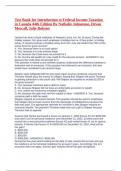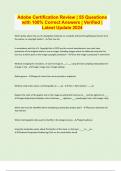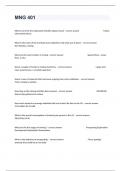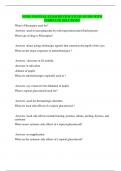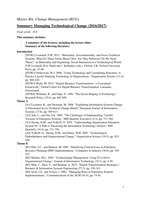Test Bank for Introduction to Federal Income Taxation
in Canada 44th Edition By Nathalie Johnstone, Devan
Mescall, Julie Robson
Jessica has been a loyal employee of Newport Lexus, Inc. for 10 years. During the
holiday season, NLI gives each employee a holiday ham or, if they prefer, a holiday
turkey. If Jessica receives a holiday turkey from NLI, may she deduct the FMV of the
turkey from her gross income?
A. Yes, because there is no cash option
B. Yes, because it is a de minimis fringe
C. No, because the Code does not provide for it
D. No, but she will qualify for a tax credit for the relevant amount - ANSWER C. No,
because the Code does not provide for it
This question is meant to test whether students understand the difference between a
deduction and an exclusion. If the question had referred to an exclusion, this item
would have constituted a de minimis fringe.
Skipper owes Gilligan$2,000 for prior boat repair services rendered. Assume that
Thurston Howell pays the money to Gilligan, hoping that Skipper will assist Thurston
in gaining admission to the yacht club. Will Skipper be required to include $2,000 in
his gross income?
A. Yes, because someone paid a debt he owed
B. No, because Skipper did not have an undeniable accession to wealth
C. Yes, unless the insolvency exception applies
D. No, because the gain was not from capital or labor - ANSWER A. Yes, because
someone paid a debt he owed.
Skipper enjoyed an economic benefit. This question should be used to emphasize
that Skipper did not have income from the discharge of indebtedness because the
debt was paid. The appropriate rationale for inclusion is that Skipper enjoyed an
economic benefit. The payment Thurston made was not a gift to Skipper because
Thurston had an agenda.
Assume that Harriet purchased a house on January 1, 2000 (house #1) for $200,000
and used it as her personal residence until December 31, 2002, at which point she
moved into a new personal residence (house #2) and rented house #1 out to various
tenants. If Harriet sold house #1 for $500,000 on December 31, 2010, what will be
her gain?
A. $250,000
B. $500,000
C. $50,000
D. $300,000 - ANSWER D. $300,000
During the five-year period ending on the date of sale, Harriet did not own and use
the residence as her principal residence for at least 2 years. Accordingly, the 121
exclusion does not apply, and her gain realized will be her gain recognized.
,Assume that Harriet purchased a house on January 1, 2000 (house #1) for $200,000
and used it as her personal residence until December 31, 2002, at which point she
moved into a new personal residence (house #2) and rented house #1 out to various
tenants. If Harriet sold house #1 for $500,000 on December 31, 2010, which of the
following is not True?
I. Harriet's amount realized was $500,000
II. Harriet's gain realized was $500,00
III. Harriet's basis in the house was $200,000
IV. Harriet's gain recognized was $300,000
A. II only
B. I and II only
C. II and IV only
D. III only - ANSWER A. II only
The gain realized was $300,000, not $500,000
While attending an estate sale, Carmella found and purchased an old piano. Once
she had the instrument at home, she started cleaning it and the bench. If Carmella
found $10,000 under the piano bench cover, must she include the amount in her
gross income?
A. Yes, but only to the extent it exceeds her basis in the piano
B. Yes, because it is an undeniable accession to wealth
C. No, because it was not derived from labor or capital
D. No, because it is excludable as treasure trove - ANSWER B. Yes, because it is an
undeniable accession to wealth.
This question tests recall of Cesarini and requires recognition of part of the standard
set forth in Glenshaw Glass.
James purchased 100 shares of Yahoo for $1/share in 1990. The stock had
appreciated in value to $4/share by 2004, at which point James gave it to Fenimore
as a Christmas gift. Sadly, Fenimore passed away suddenly in 2008 at a time when
the stock had FMV of $8/share. Cooper inherited the stock from Fenimore at that
time. If Cooper sells the stock for $1,000 in 2010, what will be his gain realized?
A. $1,000
B. $600
C. $900
D. $200 - ANSWER D. $200
Cooper inherited the stock and, per 1014, took a FMV basis in the stock of $800.
Having disposed of the stock for $1,000, his gain realized is $200.
James purchased 100 shares of Yahoo!, Inc. for $1/share in 1990. The stock had
appreciated in value to $4/share by 2004, at which point James gave it to Fenimore
as a Christmas gift. What amount, if any, must Fenimore include in income on
receipt of dividends paid with respect to the stock?
A. All of it, because the Duberstein standard is not satisfied
B. All of it, because the Internal Revenue Code requires it
C. None of it, because the amount is associated with a gift
D. None of it, because James will have to include the amount in income - ANSWER
B. All of it, because the IRC requires it.
See 61(a)(7) and 102(b)(1)
,Giamatti is a waiter at The Diner from 6 a.m. to 3 p.m. Although Giamatti must have
his lunch on the premises, he is encouraged (but not required) to have breakfast
there (so as to facilitate timely opening of the restaurant). The Diner provides both
breakfast and lunch to Giamatti free of charge on his work days. What amount, if
any, must Giamatti include in his gross income as a result of this practice?
A. The FMV of the breakfasts
B. The FMV of the lunches
C. The FMV of both the breakfasts and the lunches
D. The FMV of neither the breakfasts or the lunches - ANSWER D. The FMV of
neither the breakfasts or the lunches
The items qualify for exclusion under 119(a)(1) because, ultimately, they are
provided for the convenience of his employer, and the other requirements of 119 are
satisfied.
Mary owned a car which she originally purchased for $20,000. Having fallen on hard
times, she borrowed $15,000 from Sharkz, Inc. and used the car as collateral. She
defaulted on the loan on February 4, 2009, after having paid the balance down to
$10,000. Sharkz took possession of the car and sold it at a commercially reasonable
sale for $10,000. With respect to the loan, what will be the tax impact of the
repossession and sale on Mary (assuming she is not insolvent)?
A. Mary will have $15,000 of income from discharge of indebtedness
B. Mary will have no income from discharge of indebtedness
C. Mary will have $5,000 of income from discharge of indebtedness
D. Mary will have $10,000 of income from discharge of indebtedness - ANSWER B.
Mary will have no income from discharge of indebtedness
Although the vehicle was sold in the wake of a repossession, Mary's debt obligation
was ultimately paid. Accordingly, she has no income from the discharge of the
indebtedness.
Pellegrino works at The Lumber Company ("TLC"). As a result of TLC's negligence
(improper maintenance of equipment), Pellegrino lost one of his thumbs in a work-
related accident. Pellegrino filed suit against TLC, but the parties promptly reached a
settlement agreement in under which Pellegrino was paid $40,000 on account of his
physical injury. How much, if any, of this amount must Pellegrino include in his gross
income, assuming he took no medical expense deductions in connection with the
accident?
A. $0, because the amount qualifies for exclusion
B. $0, because the money makes him "whole"
C. $40,000, because the amount was not awarded by a court as damages
D. $40,000, because the amount will be deductible by TLC - ANSWER A. $0,
because the amount qualifies for exclusion
This question requires basic application of 104(a)(2)
Indira purchased a house on January 1, 2000 for $500,000 and has used it as her
principal residence since then. On January 1, 2004, she married Indigo, and he
moved in with her. Assume that the foregoing is a full statement of all relevant facts.
If the couple sold the house on January 2, 2006 for $1.1M, what amount, if any must
they include in gross income on their joint federal income tax return in connection
with this transaction?
, A. $600,000
B. $500,000
C. $100,000
D. $350,000 - ANSWER C. $100,000
The couple qualifies for the $500,000 exclusion provided by 121. Given that their
gain realized was $600,000, the amount of gain they must recognize is $100,000.
Jill purchased a bicycle for personal use earlier this year. Although she had felt
reasonably sure that she could park it on her patio without incident, she recently
realized that the bike had been stolen. Does this unfortunate event qualify Jill for
some type of deduction?
A. No, because the loss was not attributable to a federally declared disaster
B. No, because individuals may deduct only trade or business losses
C. Yes, because individuals may deduct other casualties or thefts
D. Yes, but only to the extent the loss exceeds 10% of her AGI - ANSWER A. No,
because the loss was not attributable to a federally declared disaster.
Section 165(h)(5) requires this result.
Nick is the evening manager of the RedRum Resort. Assuming that he is required to
live within 3 miles of the resort (so that he can be available in short order), must Nick
include any amount in gross income if he opts to reside (free of charge) on the
business premises in the manager's suite of rooms?
A. Yes, because he has an off-site living option
B. Yes, because there is foregone revenue
C. No, because he must be available during evening hours
D. No, because this is for the convenience of his employer - ANSWER A. Yes,
because he has an off-site living option.
Section 119(a)(2) dictates that the employee be required to accept lodging on the
employer's business premised as a condition of his employment.
Hans purchased an Omega watch for $5,000 in 2008. It has since appreciated in
value to $8,000 as a collector's item. If Hans sells the watch this year for $7,000 in
cash and $1,000 in stock, what will be his amount realized?
A. $8,000, because that is the amount of money and FMV of the property he
received
B. $5,000, although he will only have to recognize $3000 of gain
C. $3,000, because he is allowed a tax-free recovery of capital
D. $7,000, but his gain realized will be $3000 - ANSWER A. $8,000, because that is
the amount of money and FMV of the property he received.
See 1001(b).
In his will, Manning Parks bequeathed 2,000 shares of stock to his daughter, Pearle.
As it turns out, Pearle pre-deceased her father. When Manning died in 2008, the
stock went to Pearle's twin daughters, Sugar and Sweet. Assuming the stock (worth
$50,000 in the aggregate in 2008) was divided equally, what amount, if any, must
each granddaughter include in gross income as a result of this transaction?
A. $0, but both will take their grandfather's basis in the stock
B. $25,000, because their mother was the legatee
C. $0, and each will take a fair market value basis in the stock

